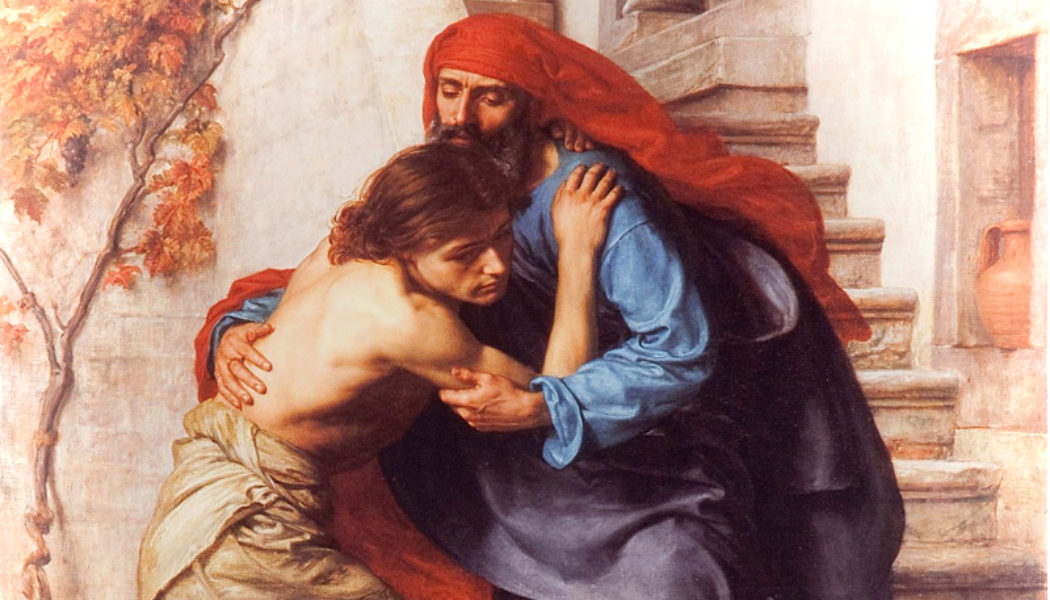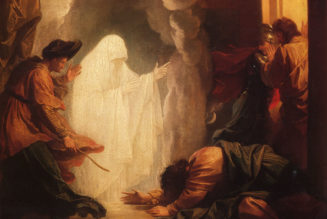
“My son is totally gone,” Dianne explained. “I love him, and I really hope he’ll see the light one day, but there’s absolutely no way he’ll ever come back to the Church. It’s hopeless.”
Many parents feel this borderline despair. They look at how far their children have drifted, and they can’t see any possible way they would return to the Church. Their children show zero interest in religious things, or they’ve developed such strong feelings against the Church that it would take a miracle for them to come back.
But what I’ve learned time and again, talking with many parents and young adults, is that this is one of the most common and devastating myths. No child is hopeless, and there is always a path back to the Church.
How do we know?
Because your child is ultimately in God’s hands, who loves him even more than you do. He wants him back more than you do, and in his providence, he can do anything.
But when we believe this myth that there’s no hope, we become jaded and frozen. We think, “The situation’s hopeless. There’s nothing I can do, so I won’t even try.”
That myth is just one of many, and each of them can seriously prevent you from making headway with your child. Today, we’ll carefully expose each of these myths, clearing our line of sight so we can better see how to facilitate your child’s return.
Myth #1: “They’ll come back eventually once they get married or have kids.”
Truth: As young adults increasingly delay marriage and having children, the odds are low they’ll return because of those events.
For many young adults, “taking a break from religion” is a normal part of emerging adult life. They complete the initial sacraments (Baptism, First Communion, and Confirmation), jump through the major “hoops” of Catholic religious education, and then settle down and pack away their religion until, perhaps, marriage and children come along. It’s not that young people drift passively down this path.
According to Notre Dame sociologists, “Some youth seem to expect to be religiously inactive during their pre-marriage, emerging adult years.” Many parents who are baby boomers or Generation Xers traveled this path, and their children naturally expect to follow suit.
But will marriage and children really bring them back? At least statistically, the answer seems to be “probably not.” One reason is that young people are delaying marriage longer than ever before. Our culture presumes that you should put off marriage so you can focus on your education and career first. As a millennial, I can confirm this is pretty much what all of my young adult peers believe.
Consequently, the average marrying age for both men and women has soared over the past several decades. In 1960, the median age for first marriage was 23 for men and 20 for women; it’s now 29 and 27, respectively.
Researchers at the National Marriage Project at the University of Virginia conclude, “Culturally, young adults have increasingly come to see marriage as a ‘capstone’ rather than a ‘cornerstone’—that is, something they do after they have all their other ducks in a row, rather than a foundation for launching into adulthood and parenthood.”
How does that affect our mission of drawing them back to the Church? Well, the longer they delay marriage, the longer they stay away from the Church. Worse, even when they do get married, they’re less likely to get married in the Catholic Church—especially if the couple is already living together or has been married before. Most couples choose to get married elsewhere and therefore marriage does not serve as an opportunity to draw them back.
A second problem is that even after getting married, young people may not have children right away—or at all. Birth rates for U.S. women in their twenties dropped more than 15% between 2007 and 2012, and the 2013 data from the Centers for Disease Control and Prevention (CDC) revealed that for every 1,000 U.S. women of childbearing age, there were just 58.2 births in 2019—the lowest birthrate in recorded American history.
But doesn’t that just mean young women are having babies later in life? Researchers from Princeton analyzed the CDC data and cast doubt on the notion of a “baby rebound.” They found that women in their early twenties are likely to forgo births altogether, not just postpone them. So, if young people today are not having babies, or at least waiting a long time to have them, it’s increasingly unlikely that they’ll return to have their children baptized or raised in the Church.
What does all this mean? Marriage and childbearing are no longer reliable magnets to pull people back to the Church. We can’t count on them, assuming they’ll magically do all the work for us. Their pull has diminished to the point where, for many young adults, we have to assume that neither life moment—marriage or children—will exercise any significant draw back to the Church.
Myth #2: “I took them to Mass and sent them to Catholic schools—that should have been enough, right?”
Truth: Simply moving through Catholic institutions doesn’t ensure that a young person encounters the Lord or develops a strong, personal faith.
Lisa, a mother of two fallen-away Catholics, gave voice to this myth: “Perhaps we were too strict with the mechanics of the faith. We helped our children practice our faith by going to Mass, but they never developed their own personal relationship with Jesus. That was the missing piece that I was unable to pass on since I didn’t have my own reconversion until later in life (you can’t give what you don’t have). Lacking a personal relationship with Jesus, I tried to compensate by pushing the rules, rituals, and rites of Catholicism onto my kids. Now, even though my adult daughters are otherwise very moral in their behaviors, they do not practice their faith. The rituals without the relationship were not worth keeping.”
Throughout the nineteenth and twentieth centuries, American Catholicism flourished through institutions. In most cases, children moved smoothly through our religious systems. They were born in Catholic hospitals, attended Catholics schools, participated in religious education classes, and enrolled in Catholic colleges. Most emerged as strong Catholics on the other side.
But that’s rarely the case anymore.
We can’t assume today, despite the valiant effort of many pastors, educators, and ministry leaders, that when a child moves through our institutions, he will develop a genuine friendship with Jesus Christ.
In their book Young Catholic America: Emerging Adults In, Out of, and Gone from the Church, researchers at Notre Dame found “there is no significant direct effect of attending a Catholic school on increased religiousness in emerging adulthood.” Even when the researchers controlled for students’ family background, Catholic high schools had “little to no independent influence five years later on those who attended them.”
A recent Pew Forum study arrived at a similar conclusion. “Former Catholics who are now unaffiliated are just as likely as lifelong Catholics to have participated in religious institutions and practices such as religious education classes (68% and 71%, respectively) and religious youth groups (32% for both groups).”
In other words, sadly, participating in church, attending religious education classes, and joining a parish youth group seem to have little to no effect on whether young people sustain their faith into adulthood.
That’s not entirely the fault of our institutions. The problem is that we’re expecting the institutions to bear the entire burden of evangelizing our children, something they were never meant to do.
The Church has been very clear about this. In the Catechism of the Catholic Church we learn that the most responsible party for forming our children is not the parishes or schools, but the parents.
“Through the grace of the sacrament of marriage,” the Catechism says, “parents receive the responsibility and privilege of evangelizing their children. Parents should initiate their children at an early age into the mysteries of the faith of which they are the ‘first heralds’ for their children. They should associate them from their tenderest years with the life of the Church. A wholesome family life can foster interior dispositions that are a genuine preparation for a living faith and remain a support for it throughout one’s life.”
All of this holds for attending Mass too. Just as putting your children in Catholic schools isn’t enough, so bringing them to Mass, even consistently, isn’t enough, by itself, to instill a deep and lasting faith. The sacraments aren’t magic. If your child received the Eucharist without adequate formation, or was confirmed without the proper disposition, there’s a good chance he may not have cooperated with the grace flowing from those sacraments.
But here’s the good news: once your child does have the proper disposition, which this book will help guide him toward, the results will be incredible. The sacraments will profoundly transform his life.
Myth #3: “They left because of me. It’s all my fault!”
Truth: There are almost always multiple causes, and it’s not all your fault.
Ronda’s son left the Church at age sixteen and didn’t return until he was thirty-two. As with many parents, she felt buried under an avalanche of regret and guilt.
“I remember wrestling with tormenting thoughts such as, ‘I should have seen this coming’ or ‘I could have taken more time with him’ or ‘I ought to have known . . .’ or ‘If only I had . . .’ I was not perfect in my parenting. None of us are. By the time we have it figured out, our kids are out the door. Imperfection does not make for a bad parent. Beating yourself up with the should’s and have’s and ought to’s will drain you of the energy you need to see this through. Mostly I would advise, just don’t go there. Set those thoughts aside for another day, and when that day comes push them on into the next. There is nothing you can do about the past, but there is a whole lot you can do about today.” (“To the Parent of a Prodigal,” Ronda’s Resting Place)
Not only is it a myth to believe that you’re solely responsible for your child denouncing God or leaving the Church or drifting away—it can be utterly devastating. I’ve seen many parents become spiritually paralyzed through such guilt.
There is no doubt that we have a powerful influence over our children. Good parenting has an impact, as does bad parenting. But having an influence is not the same as having control. Every person has free will, which means that even if we provide the ideal atmosphere for faith to take root, our child may still reject it.
You could take your child to Mass, enroll him in Catholic schools, facilitate moving religious experiences, provide him with the best answers to his questions, and offer a compelling witness of holiness. Yet even after all that, your child may still choose another path. The gift of free will requires that he has the option.
You can’t make the decision for your children. As my friend Bert Ghezzi counsels, “We can drag loved ones to places where we think the Holy Spirit might strike, but we cannot climb into their skins and manipulate their free wills. Their faith decisions are between them and God—which means if they do drop out, we cannot legitimately be held responsible for that decision.”
Now of course this doesn’t mean we parents are completely blameless when a child leaves the faith. Certainly, none of us are perfect parents, which means we likely contributed something, if only a little, to our child’s drifting away. But you are not completely responsible for the decision—it likely involved several factors outside of your control—and even more importantly, you can play a key role in drawing him back.
Coming to grips with this reality is hard but liberating. Once you realize that the only thing you can do as a parent is to facilitate the best environment for your child to know and love God, you can focus on that goal rather than stressing out about how your child responds to your overtures. Let the layers of self-blame and guilt peel off of you as you redirect your focus to helping your child return.
It’s likely this shift in perspective will also help your child. If you blame yourself for your child leaving the faith, that may become clear to your child and give him an easy excuse. Your child might think, “Hmm. I can either take responsibility for my own bad moral and religious decisions, or I can blame you, my parent. Okay, I choose you.”
What child wouldn’t alleviate his own responsibility and put the blame on you? But if your child senses you no longer hold yourself accountable for his religious decisions, the jig is up. What he does from that point forward is a reflection of his decisions and actions, not yours. You giving up responsibility places the burden where it belongs—on him.
Ultimately, the main way to move past this myth is to detach yourself from your children and their religious decisions. This doesn’t mean you aren’t interested or involved, but it means you won’t let his choices shape your own identity and self-evaluation. “If being the parent of your children is your core identity, you’re on shaky ground,” writes Carol Barnier, herself both a former prodigal and the parent of several teenage children.
“If every time they stumble, you find yourself questioning your own value, you’re on shaky ground. If every time they make a serious mistake, you find yourself sinking into an isolated depression, you’re on shaky ground. If anything your kids do has the power to lead you to believe you are worthless, you’re on shaky ground. Our kids are not meant to be our center. The one identity that is sound, true, and unshakable is that you are a precious child of God.”
Myth #4: “They won’t listen to me; it’s just impossible to have a discussion about faith.”
Truth: Your first goal should be to listen to them, not talk at them. Through listening, conversations will start to bear fruit.
For many parents, their child’s departure from the Church is doubly tragic, first because the child has turned his back on the faith, but second because he’s not open to discussing why. This leaves parents in a bind. They want to discuss the matter with their children and help change their minds. But their children shut down the conversation before it can even begin. Even a mention of “God” or “Church” or “Catholicism” can trigger a heated reaction.
Thankfully, there are several ways to open up a fruitful dialogue, even when doing so seems impossible. The most important tactic, though, is to stop talking at your child about the faith and to start listening to his opinions and feelings.
For instance, instead of nagging your child about why it’s so important for him to start going to Mass again, ask why he’s decided to stop going. Instead of inquiring why he no longer believes in God, ask what changed his mind. If he takes issue with the Church’s teaching on contraception, homosexuality, or divorce, ask what bothers him most about it.
Leading with questions and an attitude of listening can open up even the most closed-hearted young person to conversation.
Myth #5: “It’s hopeless. No matter what happens, my child is never coming back to the Church.”
Truth: It’s never hopeless. God will never give up on your child and neither should you.
One thing you must know, deep in your bones and with absolute certainty, is that God will never give up on your child. Nobody wants to see your child return to the faith and be saved more than God does. St. Augustine affirmed that God loves each of us as if there were only one of us to love. He loves your child infinitely; his love, concern, and desire has no limits.
So be sure of one thing: God will never stop pursuing your child. Which means there is always hope.
Remember Jesus’ parable of the prodigal son. A reckless child deserts his father, fleeing to the first-century equivalent of Las Vegas. He squanders all of his money on wild living. But despite getting all the pleasure he can acquire, it isn’t enough. He still isn’t satisfied. Coming to his senses, he realizes that true happiness comes not from money or sex or parties, but from love, the very love he had rejected. So he decides to return to his father, in shame and sorrow, to apologize for his rash decisions and to beg his father to hire him as a servant.
But before the son has a chance to apologize, his father spots him in the distance and runs toward him. When the father reaches his son, he doesn’t excoriate him or issue a list of requirements that must be met in order to welcome him back—he throws his arms around him and kisses him. Instead of letting his son apologize, the father turns to his servants and says, “Quickly bring the finest robe and put it on him; put a ring on his finger and sandals on his feet. Take the fattened calf and slaughter it. Then let us celebrate with a feast, because this son of mine was dead, and has come to life again; he was lost, and has been found” (Luke 15:22–24).
The point of the parable is clear: no matter how far your child has drifted from God or the Church, no matter what sort of promiscuity or problems or darkness he has fallen into, God is yearning to embrace him. The Lord isn’t just waiting disinterestedly for your child to return. He is pacing the horizon, preparing to rush toward your child at even the smallest sign of openness. God will never give up on your child.
Even if your child has drifted away from the Church, it doesn’t mean he has stopped believing in God. Statistics show that most former Catholics, including many of the unaffiliated, still love God, pray, and are open to spiritual things. So even if on the surface it looks like your child has renounced faith altogether, he may just be wrestling with moral issues or questions surrounding the Catholic Church.
From our dim and incomplete view, trapped as we are within the limits of space and time, it may seem impossible that your child would ever consider returning to the Church. It may require a huge change in his thinking, his actions, and his lifestyle. But knowing there’s always hope can reassure us even when the path forward is unclear.
So commit right now to getting rid of the discouraging idea that there’s no hope—there is always hope, and you will soon know it well.
Follow ChurchPOP:
Telegram Channel
Gab
Parler
Signal Group
WhatsApp Group 1
WhatsApp Group 2
ChurchPOP Facebook Group
[See also: Scott Hahn’s Son to be Ordained a Priest, Shares Soul-Stirring Testament: “Marvel is in This Very Moment”]
[See also: Super Cute! This Video of a 3 Yr-Old Playing Mass Is Going Viral]
Do you love ChurchPOP?
Get our inspiring content delivered to your inbox – FREE!
As part of this free service you may receive occasional offers from us at EWTN News and EWTN. We won’t rent or sell your information, and you can unsubscribe at any time.
Join Our Telegram Group : Salvation & Prosperity









